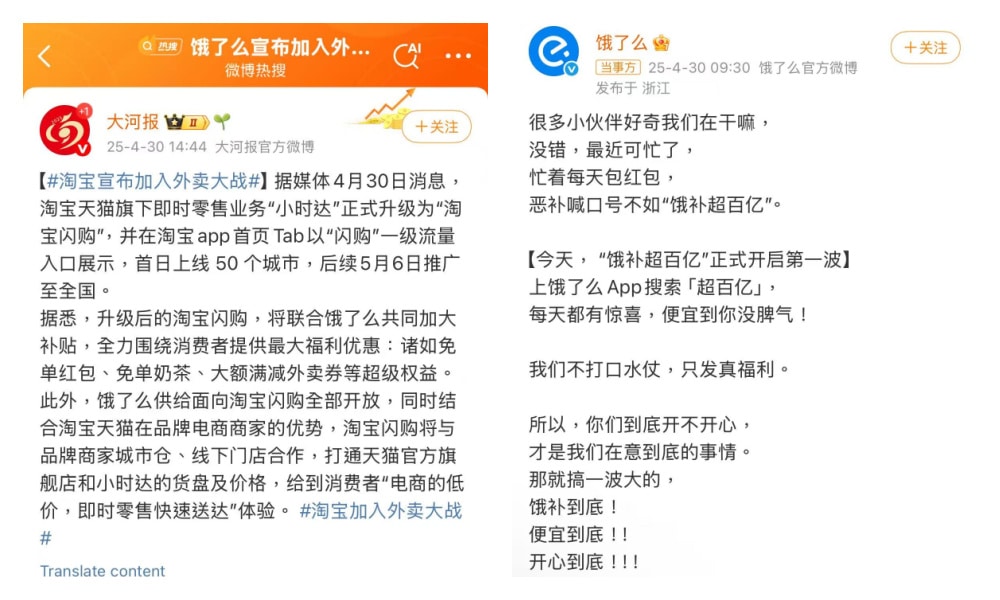Featured
Weibo Watch: The Battle for the Bottom Bed
“The battle for the lower bunk beds” (“下铺之争”) is a reflection of society and generational difference in China, touching upon expectations regarding the respect younger individuals should show the elderly.
Published
1 year agoon

PREMIUM NEWSLETTER | ISSUE #27
This week’s newsletter:
◼︎ 1. Editor’s Note – Battle for the Bottom Bed
◼︎ 2. What’s Been Trending – A closer look at the featured stories
◼︎ 3. What More to Know – Five bit-sized trends
◼︎ 4. What’s the Drama – Top TV to watch
◼︎ 5. What’s Noteworthy – Zara x Haidilao
◼︎ 6. What’s Popular – Martin Garrix x Huang Zitao
◼︎ 7. What’s Memorable – Social media in times of flood
◼︎ 8. Weibo Word of the Week – Coffin rooms
Dear Reader,
Sometime around last summer, a significant debate about train etiquette began trending on Chinese social media. Central to the discussion was a question that attracted over 190 million views on Weibo: Can passengers bring their own “bed curtains”?
The curtains in question (床帘 chuánglián, also 火车遮挡帘 huǒchē zhēdǎnglián) are often used in the cheapest class of sleeper cabins on Chinese trains, known as hard sleepers (硬卧 yìngwò). In these cabins, each compartment features six bunk beds, with three beds on each side separated by a small table. Only the bottom bunk offers sufficient space for seating and is also the most expensive among the three.

Example of Chinese hard sleeper train compartment, image via Sohu.
Train carriages usually comprise 11 semi-open compartments, each featuring a corridor and two foldable seats per cubicle. With so many people in one carriage, noise can become an issue, and privacy can be hard to come by.
“Bed curtains” have emerged as a popular strategy to combat these nuisances, creating a somewhat private and quiet space on trains without disturbance from fellow travelers. Essentially, they are pieces of fabric that can be easily secured above or on the sides of the bunk bed using clips or ropes. These days, Taobao sells them in various colors and patterns.

Bunk bed curtains, sold on e-commerce sites likes Taobao, turn lower bunk beds in a more private space.
Recently, the debate over these curtains reignited on Chinese social media, particularly focusing on how their use creates an additional barrier for other passengers, especially the elderly, to sit on the lower beds. This sparked discussions about whether younger passengers should consider swapping their lower bunk beds with senior passengers, who may find it difficult to access the middle and upper berths, where it’s often impossible for them to sit up straight.
The catalyst for these discussions was a viral video featuring an elderly lady confronting two young people who had hung covers on their bottom bunk beds. She accused them of selfishness for not allowing older passengers with upper bunk tickets to sit on their beds.
Many commenters expressed support for the young passengers in the video, emphasizing that they are not obliged to let other passengers sit on their bed. The topic unleashed a flood of stories of train annoyances about strangers sitting on people’s bottom beds, depriving them of privacy.
The topic further popularized the use of bed curtains, with commenters writing: “I dislike others sitting on my bed but find it difficult to confront them; this is such a clever solution!”
There are currently no explicit regulations prohibiting or allowing these bed curtains, as long as they do not cause inconvenience or block access to other bunks, but many people view them as “uncivilized” and “impolite.”
The online critics of bed curtains often fondly recall their experiences traveling on China’s sleeper trains in past decades. They reminisce about meeting strangers, sharing snacks, playing cards, and forming friendships—experiences characterized by less privacy, but more camaraderie.
As this discussion has been dubbed “the battle for the lower bunk beds” (“下铺之争”), it’s evident that it encompasses more than just seating arrangements. Some say it is a reflection of the current society. It touches upon societal shifts, traditional/cultural expectations regarding the respect younger individuals should show the elderly, and mostly, generational differences.
Unlike the older generations preceding them, Chinese younger generations, products of the one-child policy and growing up amid increasing prosperity, have undergone a significant transformation in their familial roles over the past decades. Not only were they both pampered and pressured to succeed, they also often enjoyed having their own rooms from a young age. Their upbringing has fostered a more individualistic perspective, a heightened emphasis on personal happiness, and a greater value placed on privacy.
Additionally, while previous generations typically ‘served’ their parents, you see that parents often prioritize ‘serving’ their children of younger generations, treating them as equals within the household. This has also led to different views on the interaction between younger and older members of society. Many younger people won’t accept Chinese seniors acting rude or entitled simply because of their age.
The “battle for the bottom bed” essentially symbolizes clashes between different generations. While older generations value communal experiences and respect for elders, younger generations assert their individual rights and prioritize personal space. Given the insufficient seating for all six passengers in current hard sleepers, they argue that it’s China Railways’ responsibility to adapt the layout to better cater to passengers’ needs.
Meanwhile, some Chinese ‘experts’ are cited by media, encouraging young people who have bought lower berths to be understanding and swap with the elderly for their convenience. A related hashtag on the matter was viewed more than 400 million times on Weibo, and the most popular replies basically told the experts to shove their suggestion up theirs. “I have the right to what I pay for,” some said: “If they need a lower bed, let them pay for a lower bed.”
Some bloggers comment that the very fact that this seemingly trivial topic has become such a major topic of debate on Chinese social media is a sign of a “regression in morality.” Some propaganda accounts raise the example of the humble PLA soldier Lei Feng, who would help out other passengers and train staff while traveling, instead of occupying a seat. While most do not expect the same of modern-day travelers, they do think that people, young and old, should show a little more understanding for each other.
In this light, another video garnered attention. It showed an elderly woman on a train politely requesting to swap a top bunk with a young passenger occupying a bottom bunk. The request was made on behalf of her 83-year-old travel companion, and they were happy to compensate for the price difference. That video received praise from netizens, who expressed that it’s the attitude that matters. The young passenger swapped beds with the older lady and did not accept payment for it.
In the end, it’s clear that kindness and empathy are cross-generational, and that communication always helps bridging differences.
In case you don’t feel like bridging differences on your next hard sleeper train, however, here’s the link to the bed curtains.
Warm regards,
– Manya Koetse & Miranda Barnes
What’s Been Trending

1: Chengdu Disneyland | Chengdu Disney is the latest viral hotspot on Chinese social media, and it’s probably unlike anything you’d imagine. How did an ordinary outdoor senior gym in a local Chengdu neighborhood become nationally known as ‘Chengdu Disney’? By mixing online trends with real-life fun, blending foreign styles with local charm, and adding a dash of humor and absurdity, Chengdu now boasts its very own ‘Chengdu Disney.’ We explain the trend here👇🏼

2: Unleashing Flood of Stories | The recent marriage announcement of the renowned Chinese calligrapher/painter Fan Zeng and Xu Meng, a Beijing TV presenter 50 years his junior, has sparked online discussions about the life and work of the esteemed Chinese artist. Some netizens think Fan lacks the integrity expected of a Chinese scholar-artist.

3: Yellen’s Favorites | Earlier in April, Yellen concluded her second trip to Beijing within a year, and once again, it’s not her official talks but rather her choices in food and drink venues that are sparking discussion on social media. From Yunnan classics to fusion cuisine, these are Janet Yellen’s picks for dining and drinking in Beijing.
What More to Know
◼︎ 🌧️ Guangdong Floods | Flooding, landslides, power outages. It’s been a rough few days in Guangdong. From the provincial capital Guangzhou to smaller cities like Shaoguan, Zhaoqing, and Qingyuan, exceptionally heavy rainfall since April 18 has brought significant problems to various areas. At least 4 deaths have been reported, with 10 people still missing. More than 100,000 people have been evacuated. The regions hardest hit are along the Beijiang River, which flooded on April 21. This marks the second flood of the river this year, with the first occurring on April 7, marking the earliest date in the season since floods in major Chinese rivers began being numbered in 1998. As with previous floods, social media is used as a channel to warn people about the ongoing situation, with further rainfall expected. Meanwhile, state media are honoring rescue workers as local heroes, or ‘those going against the tide’ (nìxíngzhě 逆行者).
◼︎ 🌋 Ijen Crater Death | A 31-year-old Chinese tourist tragically lost her life after falling from the edge of Indonesia’s Ijen volcano while attempting to take a photo. She tripped over her own long skirt, plummeting from a height of 75 meters early on the morning of April 20, while the tourists were there to witness the sunrise. With the May 1st holiday approaching, Chinese authorities, through social media, are using this incident as a cautionary tale to warn tourists of the hazards of prioritizing that ‘perfect social media photo’ over personal safety.
◼︎ 💀 Another University Poisoning Case | One recurring case that surfaces on Weibo is that of Zhu Ling, the female victim in the notorious 1995 thallium poisoning incident at Beijing’s Tsinghua University. Although Zhu Ling survived, she was left paralyzed and reliant on her parents for care for the rest of her life. The case remains unsolved, with many pointing to her roommate as the primary suspect. Now, a new suspected poisoning incident at a university has gained attention, following the death of a 25-year-old male student at Xiangtan University due to organ failure after seeking medical treatment. His 27-year-old roommate is currently under suspicion and has been detained. This is a case that is likely to draw further scrutiny in the time to come.
◼︎ 🏃♂️ Marathon Controversy | There was something fishy about the conclusion of the Beijing Half Marathon and the four runners at the finish line. In a video clip that went viral on Chinese social media (see here), viewers observed that three African runners seemed to intentionally slow down to allow Chinese competitor He Jie (何杰) to win the gold medal. Now, the Beijing Half Marathon Organizing Committee has announced the disqualification of all four runners for “breaching the rules of the competition,” nullifying their results, and reclaiming their trophies and medals. The Chinese Athletics Association has also introduced new regulations for discipline management in national events. It appears that the three African runners were “pace setters” who were not intended to be competing athletes, and sponsor/partner Xtep (特步), a sports equipment company, was responsible for not properly identifying them. Consequently, the company has been terminated as a partner. Marathon fraud and the importance of properly regulating major sports events has become a recurring topic on Chinese social media. Last October, the Chinese Athletics Association issued an emergency notice to standardize and regulate China’s national marathon and running events more effectively after Chinese marathon runner Yin Shunjin appeared to be intentionally obstructed by a support vehicle, forcing him to navigate around it and costing him valuable time in the crucial final two minutes of the marathon.
◼︎ 🎲 Little Tuan Tuan Goes to Jail | Popular Chinese influencer “Little Tuan Tuan” (一条小团团), who has millions of followers on the Douyu livestreaming app, became a top trending topic on Chinese social media on April 23 after news came out that she had been arrested. The famous game livestreamer had already stopped airing since last month, but it only now became known that she is suspected of engaging in large-scale illegal gambling activities. In late 2023, Douyu’s chairman and CEO Chen Shaojie was also arrested for allegedly hosting online gambling, which is illegal in mainland China. At the time, state media already reported that the arrest of Chen may lead to a group of top game anchors being implicated due to their involvement in gambling and money laundering. After the earlier arrest of four other anchors, Tuan Tuan is the latest livestream host to be arrested, signaling a zero tolerance approach towards gambling activities in China’s game-focused livestreaming world. Little Tuan Tuan could face up to five years in prison.
What’s the Drama

Best Choice Ever (Chéng Huān Jì 承欢记) is the latest Chinese TV drama hit. Produced by CCTV and simultaneously broadcasted on CCTV-8 and Tencent, it premiered on April 9, and some are already calling it the best romcom drama of the year. This urban family/romance drama centers around the story of Mai Chenghuan (麦承欢), a post-95 young woman living in Shanghai, who is preparing to marry her boyfriend Xin Jialiang (辛家亮), who comes from a wealthy family. However, when Chenghuan’s mum is doing all she can to meddle in their relationship, Mai Chenghuan must break free from her mother’s overbearing influence and focus on her own personal growth.
Noteworthy:
▶️ This drama is based on a book by the same name by Hong Kong writer Yi Shu or Isabel Nee Yeh-su, who is known for the strong, intelligent female characters in her stories.
▶️ The main protagonist is played by the super popular Chinese actress Yang Zi (杨紫), who previously starred in hit series such as Ode to Joy (欢乐颂) and The Oath of Love (余生).
▶️ This series is also airing in Thailand starting from April 29, but you won’t hear Yang Zi speaking Chinese there; the entire show will be dubbed in Thai.
▶️ The Shanghai Culture and Tourism office has also been involved in this production, that features some pretty scenes from around Shanghai, which is drawing in young visitors wanting to visit film locations like the Zhapu Road Bridge and Huaihuai Mansion.
You can watch Best Choice Ever online here (with English subtitles) via YouTube.
What’s Noteworthy

A short dress sold by Zara has gone viral in China for looking like the aprons used by the popular Chinese hotpot chain Haidilao. “I really thought it was a Zara x Haidialo collab,” some customers commented. Others also agree that the first thing they thought about when seeing the Zara dress was the Haidilao apron.
What’s Popular

Dutch DJ Martin Garrix found himself embroiled in controversy following the first F1 China Grand Prix Music Festival in Shanghai, which took place from Friday to Sunday. Garrix was allegedly supposed to perform together with Chinese singer Huang Zitao (黄子韬), who initially complained via livestream that the DJ did not show up to their joint rehearsal, and then claimed the DJ showed disrespect by performing his song without him being present on stage. On Weibo, one hashtag about the incident attracted over 160 million views.
Both Huang and Garrix are popular on Weibo, where the Chinese singer has over 66 million fans while the Dutch DJ has more than 360,000 followers.
In response, Garrix promptly posted a video on Weibo refuting what he called “misinformation and lies,” asserting that he and Huang Zitao were never scheduled to perform together. Hearing about Huang’s complaints, he still invited him up on stage, but he never showed up (Garrix claimed he was hiding in the bathroom). Following this, the event organizers issued an apology for the confusion.
Online, opinions remain divided, with some defending Garrix and labeling Huang a “crybaby,” while others support Huang, arguing that Garrix was rude for not wanting to share the stage with the Chinese singer. Either way, it seems the two performers won’t be sharing a beer, nor a stage, anytime soon.
What’s Memorable

This pick from our archive – in light of the current floods – revisits the flood of three years ago. The social media trends during China’s heavy rainfall and floods in Henan in July of 2021 show the multidimensionality of online communication in times of disaster. Facing the devastating downpours, Weibo became a site for participation, propaganda, and some controversial profiting.👇
Weibo Word of the Week

“Coffin Room” | Our Weibo Word of the Week is “Coffin Room” (guāncái fáng 棺材房), or even “Mini Coffin Room” (mínǐ guāncái fáng 迷你棺材房), referring to extremely tiny spaces being rented out at rooms.
The term “coffin room” isn’t new; it previously appeared in mainstream media to describe small cubicles rented out in Hong Kong to people who couldn’t afford larger spaces in the exorbitantly expensive housing market. However, it has recently resurfaced on Chinese social media to describe similarly cramped spaces in Shanghai.
One viral video showcased a rental room of about 5m² (approximately 53.82 square feet) with a makeshift sleeping space right behind a toilet, measuring about two meters long and one meter wide (approximately 6.56 feet long and 3.28 feet wide), all for a monthly rent of 300 yuan ($41). This so-called “coffin room” sparked controversy, with many deeming it absurd and a testament to Shanghai’s overheated housing market. However, the landlord mentioned that the room was already rented out to a Didi driver the day it was posted. See video here.
This is an on-site version of the Weibo Watch newsletter by What’s on Weibo. Missed last week’s newsletter? Find it here. If you are already subscribed to What’s on Weibo but are not yet receiving this newsletter in your inbox, please contact us directly to let us know.
Stories that are authored by the What's on Weibo Team are the stories that multiple authors contributed to. Please check the names at the end of the articles to see who the authors are.

You may like
China Digital
China’s Major Food Delivery Showdown: What to Know about the JD.com vs. Meituan Clash
Consumers are profiting from the full-blown delivery war between JD.com and Meituan—but is it just the same game with a different name?
Published
14 hours agoon
April 30, 2025By
Ruixin Zhang
In April 2025, China’s food delivery sector witnessed a somewhat dramatic development, which attracted major attention online, when Chinese e-commerce giant JD.com publicly challenged food delivery leader Meituan.
On April 21, JD.com posted a noteworthy open letter titled “To All Fellow Food Delivery Rider Brothers” (各位外卖骑手兄弟们) on Weibo. In this letter, they accused Meituan (though not explicitly naming them) of monopolistic practices, after the company allegedly forced their delivery staff to stop accepting JD’s delivery orders. If riders chose to deliver for both companies anyway, they’d risk being blacklisted.
JD therefore accused Meituan of unethical behavior, neglecting their workers’ welfare, and pressuring part-time couriers to choose between platforms.
In their letter, JD vowed to support the freedom of Chinese delivery riders to accept orders from various platforms, and pledged to support those who were being blacklisted by offering them sufficient order volumes and full-time positions with benefits, including employment opportunities for their partners.
The bold move, dubbed the “421 Food Delivery Incident” by netizens, ignited widespread online debate.
“Underdog” JD vs. Meituan: The Start of a New Delivery War
JD.com is a household name in China’s e-commerce industry, best known for its electronics retail business. In recent years, it has expanded into fresh groceries, online supermarkets, and instant delivery services. Meanwhile, China’s food delivery market has long been dominated by Meituan (美团) and Ele.me (饿了么), the latter owned by Alibaba. Before a recent online controversy brought attention to it, many people weren’t even aware that JD had entered the food delivery space.
JD’s entry into China’s thriving food delivery market hasn’t been too long ago—the company officially only announced its JD Waimai (京东外卖) food delivery service back in February this year.
Before JD, other major tech companies like Tencent, Baidu, and ByteDance had all tried (and failed) to challenge the dominance of Meituan and Ele.me. But JD has a strong advantage: a massive logistics system with over 300,000 (!) delivery staff. Its Dada (达达) on-demand delivery and local logistics platform also has nearly 1.3 million active couriers, making JD a serious new competitor in China’s food delivery market. Not surprisingly, JD has already started hiring away talent from Meituan.
Amid JD’s growing presence, a post surfaced in April, reportedly from Meituan executive Wang Puzhong (王莆中), mocking JD’s food delivery ambitions as laughable. He used harsh language, calling JD a “cornered dog” making a desperate move (狗急跳墙). Then, on April 15, Meituan’s Flash Delivery service (美团闪送) released a video teasing JD’s supposedly slow delivery speeds (#美团闪购疑似嘲讽京东#). The video showed a dog with the caption: “Your Dongdong is still on the way” — a direct jab at JD, whose mascot is a dog and whose founder, Richard Liu (Liu Qiangdong), is nicknamed “Dongdong.”

JD swiftly hit back. On April 16, a video from an internal JD meeting was leaked, widely seen as a deliberate PR move. In the video, JD founder Richard Liu criticized the food delivery industry, claiming platforms were making excessive profits while restaurants struggled to survive. “Running a restaurant is already hard, yet platforms—just middlemen—are making a fortune,” he said. Liu added that JD would cap its profit margin at 5% and offer full social insurance to its full-time couriers—setting the tone for the official statement that followed.
Then came JD’s April 21 post, which launched a series of serious accusations against Meituan. JD claimed that Meituan had long restricted part-time couriers from working with other platforms and had failed to provide any social insurance to its full-time riders for over ten years. It also criticized Meituan’s working conditions, accusing the company of exploiting riders through algorithm-driven pressure while ignoring their safety. Additionally, JD accused Meituan of squeezing restaurants for profit, turning a blind eye to unhygienic “ghost kitchens,” and neglecting basic food safety standards. The tone of the post was sharply critical.
The attack prompted Meituan to respond publicly. That same evening, it issued a statement on its official WeChat account, denying that it had ever restricted riders from working with other platforms. Meituan also pushed back by accusing JD of mistreating its own couriers, pointing to heavy fines and unfair internal policies as the real issue.
However, Meituan’s response did little to improve its public image. On Weibo and short-video platforms, public sentiment largely turned against Meituan. That night, a netizen posted that JD CEO Richard Liu himself had delivered their JD order. Stories of Liu chatting with riders and restaurant owners quickly went viral, reinforcing his image as a down-to-earth, working-class hero—and earning JD another wave of goodwill.

At the moment, JD enjoys strong public support—not necessarily because it’s doing everything perfectly, but because it has timed its entry well, casting itself as the underdog taking on Meituan, the widely criticized corporate giant.
The Meituan Backlash
There’s no doubt that Meituan is a true giant. In 2024, the company generated a staggering RMB 300 billion (about $41 billion) in revenue. But this delivery empire has long faced ethical criticism—and JD’s recent accusations on Weibo highlight issues that many in the industry have raised before.
Meituan’s commission rates for restaurants are notoriously high, typically ranging from 15% to 25%. According to reports, around 60% of restaurants on the platform operate at a loss—even as Meituan continues to post multi-billion-yuan profits year after year. Many restaurant owners have voiced their frustration online, saying Meituan initially attracted them with generous onboarding incentives, only to gradually increase commissions, service fees, and so-called “tech support charges.” In the end, even strong sales often fail to translate into real profit. Yet with fierce competition and Meituan’s dominance in the food delivery market, many restaurants feel they have no choice but to stay.
For workers, complaints from Meituan couriers are nothing new. The faster they deliver, the more the algorithm shortens their future delivery windows, while slower deliveries result in fewer order assignments. This creates a vicious cycle, pressuring riders to break traffic rules just to meet deadlines. Unsurprisingly, their accident rate is reported to be three times higher than that of express couriers. To make matters worse, Meituan has historically provided no social insurance—neither for full-time nor part-time riders—leaving them on their own when accidents happen. As some couriers bitterly joke, “We’re not people—we’re just human batteries.”
For consumers, the concerns are just as serious. As I noted in an earlier article, Meituan’s platform increasingly hosts “ghost kitchens”—delivery-only outlets that often operate in unsanitary conditions, producing low-cost, low-quality meals to support Meituan’s Pinhaofan service and fuel ongoing price wars. It’s hard to believe Meituan isn’t aware of these practices; it simply appears to look the other way.
These examples are just the tip of the iceberg when it comes to Meituan’s ethical challenges. But for many users, they’re reason enough to delete the app—especially now that JD has positioned itself as a credible alternative.
Of course, few believe Richard Liu is driven purely by social responsibility—he’s long been skilled at presenting himself as a “man of the people.” In JD’s early days, he famously delivered electronics himself in a three-wheeler. Still, as many netizens have put it: “Judge by actions, not intentions” (君子论迹不论心). Whatever JD’s true motives, its current words and actions seem to align with the interests of ordinary consumers and workers. But the question remains: is that enough?
Different name, same game?
For many consumers, the showdown between JD and Meituan has been surprisingly entertaining, and even financially rewarding. The more intense the rivalry, the bigger the discounts. Netizens have been sharing screenshots of good deals they’ve scored from both platforms in recent days. Some media outlets have even declared, “Richard Liu is saving food delivery and changing the industry for good!”
Meanwhile, Taobao and Ele.me have also announced that they’ll be joining the big JD–Meituan showdown by making themselves more competitive. “Taobao Flash Delivery” (淘宝闪购) will now be prominently featured on the main Taobao app, and Taobao and Ele.me will be more closely integrated under Alibaba to offer customers faster delivery times and the best prices. That means more offers—and good news for consumers.

Taobao and Ele.me also join the big battle
But offline, couriers are responding more cautiously. Rider welfare has quickly become a key issue in this corporate battle—and may even become a way for platforms to stand out in a crowded market. But big promises aren’t enough. Only real, visible improvements will earn riders’ trust.
Courier A Ping (阿平) has long been sharing food delivery vlogs online. He used to work for both Meituan and Ele.me. Since April 16, he’s started posting about JD’s delivery platform, and has raised many concerns: part-time riders apparently find it hard to get orders, the system is difficult to navigate, the dispatch logic is flawed, and the navigation is poor.
In the comments section, other couriers are joining the discussion, with many agreeing that JD’s current system only works for full-time employees. “If full-timers get the full benefits, insurance and everything, then it;s probably not that easy to become one,” one wrote. “JD looks promising now, with high pay and benefits, but give it time—it’ll end up the same as the others.”
Another rider, Yu (小于) isn’t too excited about the JD-Meituan feud either. “JD’s fine system is super strict,” he said. “At the end of the day, all these platforms are the same.” Whether JD is just using this moment for PR or genuinely stepping up to take on more social responsibility—only time will tell.
By Ruixin Zhang
Independently covering digital China for over a decade. Like what we do? Support us and get the story behind the hashtag by subscribing:
edited for clarity by Manya Koetse
Spotted a mistake or want to add something? Please let us know in comments below or email us. First-time commenters, please be patient – we will have to manually approve your comment before it appears.
©2024 Whatsonweibo. All rights reserved. Do not reproduce our content without permission – you can contact us at info@whatsonweibo.com.
China Local News
The Liaoyang Restaurant Fire That Killed 22 People
Published
2 days agoon
April 29, 2025
🔥 Quick Take: Trending in China – Week 18
This is a brief update from our curated roundup of what’s trending in China this week. A version of this story also appears in the Weibo Watch newsletter. Subscribe to stay in the loop.
An enormous fire that happened at a restaurant in Liaoning’s Liaoyang on the afternoon of April 29 (see video) has gone top trending on Chinese social media, mainly due to the fact that it caused so many fatalities.
By 7pm, Chinese official media reported that the fire, which happened at 12:25 in the city’s Baita district, had killed 22 people. Three people were injured.
The fire started on the second floor of the restaurant Sanli Chuniang (三里厨娘/Sanli Chef’s Daughter) on Minzhu Road (民主路) and quickly spread throughout the entire two-story brick-concrete structure, which covers an area of about 260 square meters. The windy weather also played a part in how quickly the fire spread. The fire broke out around lunchtime, when there were many customers.

The restaurant before and after the fire.
Some sources on Xiaohongshu report that, according to witnesses, toxic smoke filled the entire building in less than five minutes. The thick smoke, small spaces inside the two-story building, and limited escape routes — some of which were allegedly blocked — all contributed to the high number of fatalities. Some victims were reportedly just ten meters away from the exit, yet still failed to escape.
According to Caixin, the restaurant’s second floor had several private rooms without windows.
To make matters worse, some nearby vehicles were not moved in time, hindering the rescue operations.
Sanli Chuniang was a locally popular restaurant serving various Chinese dishes, snacks, and dumplings. It was in business since 2016.
On social media, many commenters are expressing shock and sadness over the deadly fire. They also want answers into why there seemed to have been little to no fire safety precautions at the establishment.
The last time a restaurant fire with many fatalities made major headlines in China was in 2023, when a gas explosion inside a BBQ restaurant in Yinchuan resulted in 31 deaths. Nine people, including the restaurant owner, were later arrested in connection with the fire and the lack of safety precautions.
Some reports on the Liaoyang restaurant fire have now been removed, but it appears that the restaurant had been operating illegally since 2023 and that its fire safety inspections were not up to date.
Guancha reported that while the cause of the fire is still under investigation, the restaurant owner has been taken into custody.
By Manya Koetse
(follow on X, LinkedIn, or Instagram)
Spotted a mistake or want to add something? Please let us know in comments below or email us. First-time commenters, please be patient – we will have to manually approve your comment before it appears.
©2025 Whatsonweibo. All rights reserved. Do not reproduce our content without permission – you can contact us at info@whatsonweibo.com.
Popular Reads
-

 China Insight12 months ago
China Insight12 months agoThe Tragic Story of “Fat Cat”: How a Chinese Gamer’s Suicide Went Viral
-

 China Digital11 months ago
China Digital11 months agoChina’s 2024 Gaokao Triggers Online Discussions on AI
-

 China Arts & Entertainment12 months ago
China Arts & Entertainment12 months agoSinging Competition or Patriotic Fight? Hunan TV’s ‘Singer 2024’ Stirs Nationalistic Sentiments
-

 China Brands, Marketing & Consumers12 months ago
China Brands, Marketing & Consumers12 months agoA Brew of Controversy: Lu Xun and LELECHA’s ‘Smoky’ Oolong Tea






